Hey, friends. Barbarella here. I had the opportunity to speak with writing/directing team Charlie and Tom Guard about their first feature in a while, DEAD SHOT. The film goes back to a time when people used religion as an excuse to kill. Oh wait, that’s still a thing. Let me rephrase. The film goes back to the mid-70’s when a fatal shooting by an SAS officer (Aml Ameen) sends a retired Irish paramilitary (Colin Morgan) to London’s mean streets on a quest for revenge.
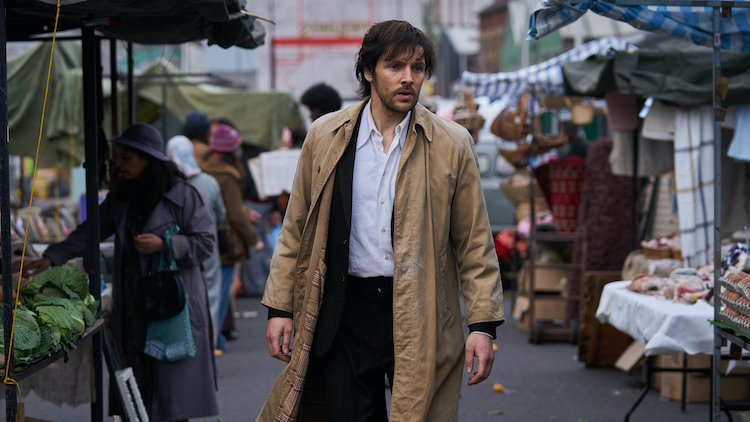 Taking me back to the 70’s, I enjoy the general vibe of the film and find a great deal of depth to the story, although I’m not sure how much of that is more a reflection of what I’m projecting into the situations and characters versus what would objectively be interpreted by other audiences.
Taking me back to the 70’s, I enjoy the general vibe of the film and find a great deal of depth to the story, although I’m not sure how much of that is more a reflection of what I’m projecting into the situations and characters versus what would objectively be interpreted by other audiences.
Still, DEAD SHOT has a lot to say about conflict, revenge, and how governments and organizations often use their members seemingly without regard to the impact on those members themselves or the society at large. It hints at mistreatment and alienation of veterans and reminds me of minority platoons who went to war for this country but were never given the same respect and elevation as their white counterparts. I’d like to believe that one day, people will stop devaluing those who don’t look or talk like themselves, but perhaps that's a topic for a different forum. Let's get back to talking movies.
As I stated at the outset, I had the opportunity to speak with Charlie and Tom about the film. Check it out!
Barbara: This is your first movie in a really long time. Why were you away so long, and what brought you back?
Charlie: We were doing a lot of commercials after THE UNINVITED, and we’ve both been very busy starting families and all that kind of fun life stuff. We’ve never gone away, though, we’ve been working away and building up to finding the right thing, and DEAD SHOT just came into our lives at a perfect moment, really, and we just immediately connected with the ideas. We had lots of stuff that was happening in our lives at the time. Brexit was going through the UK, and [there was] this idea of ideological fault lines emerging across families, neighborhoods, and generations that seemed to speak to the same sort of politics of the 70s, and the anger and the way that enormous numbers of people's lives were being affected by these horrendous acts of violence, also how those acts of violence were being perpetrated by people who were effectively being manipulated by others. The attack on the Capitol seemed to be very much an example of that. It wasn’t something that was purely to do with England or anything. It felt like it was happening across the world, so our take on the material was very much to sort of channel our feelings about those kinds of issues, our feelings about toxic masculinity, and these bad father figures into the story.
Barbara: Do you want to add anything to that Tom?
Tom: No.
Barbara: (laughing) You’re just the silent observer. Did you have some division in your family over Brexit?
Tom: No. I think the country as a whole became very divided, obviously, and those divisions appeared in surprising places sometimes. Things seem to have calmed down now. There’s a feeling of it’s just a new normal now. England adapted.
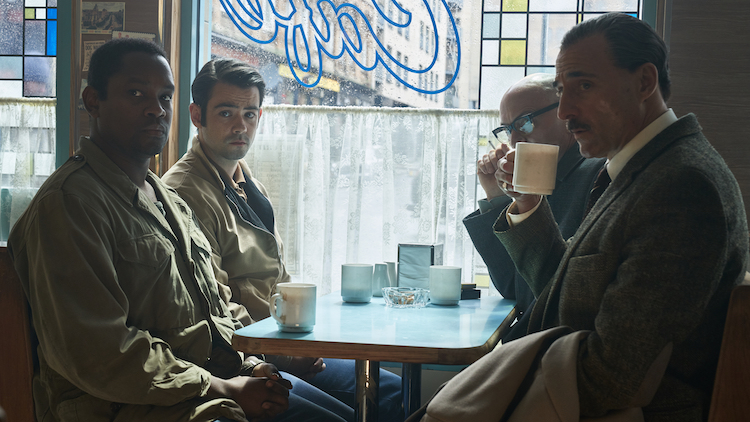 Barbara: How did this material come to you?
Barbara: How did this material come to you?
Tom: We were sent Ronan Bennett's draft by Chris Coen, and we started talking to him, and they had had a number of attempts of setting up the film and never quite getting it over the line for many different reasons, but we really responded to the cat-and-mouse in it and this idea of the chase and these two individuals who were opposed. We thought, as Charlie said, there was an opportunity to inflect it with some other things that were going on at the time and to strive for universality with the quest for revenge that both characters end up embracing.
Barbara: No good ever comes from revenge, really. Sometimes, when I watch a film, I tend to read things into it. I'll see symbolism where maybe that wasn’t intended by the filmmakers. I kind of had a moment where Tempest was looking at himself in the cracked mirror, and I was reading into that like [he had] a divided psyche. Were you thinking of symbolism or meaning behind the shots or was it just [that] it looked cool?
Tom: It was very spontaneous. That specifically was a very spontaneous moment where Aml [through] his performance expressed a huge amount of frustration and anger, and it was just one take where that happened and that was the one we used. It was just a brilliant expression of what was going on in Tempest’s mind, so we ran with it.
Charlie: We hadn’t prepped that. That was a real mirror. We hadn’t prepped it at all. We were taken by surprise when it happened. It came out of Aml’s amazing performance, but also out of the character; the duality that you were referring to was very much kind of the conflict within Tempest. This idea of being part of a country that seems to want him and need him and also reject him and push him away. The confusion of that very much comes to play in that scene, and Aml really related to that and felt very angry with that.
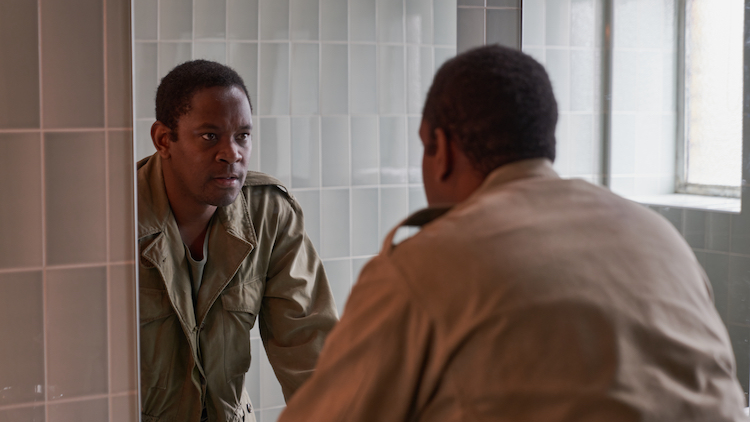 Barbara: When you’re putting together in your mind how you want everything to look, do you look for hidden symbolism or are you trying to go for hidden meaning, or do you just shoot what’s on the page? What’s your style with that?
Barbara: When you’re putting together in your mind how you want everything to look, do you look for hidden symbolism or are you trying to go for hidden meaning, or do you just shoot what’s on the page? What’s your style with that?
Charlie: We love symbolism. We love subtext. We delight in that. Very often it’s not something that you can kind of pursue in a primary way. You have to tune into the characters, tune into the story, and follow your nose really. David Lynch always says “Water finds a way,” and it’s very true. We always look at stories in the same way. When you close your eyes, you will start to see the patterns and the root of the story, and it sort of becomes a living thing. It becomes a very organic process. We love staying as open as we can to that process. Symbolism will inevitably be a wonderful byproduct of that if you’re open to it.
Barbara: I’m a fan of bringing people into the spotlight who don’t get enough recognition. Who is a crew member that would be like an MVP for you that you would like to shine a light on?
Tom: That’s a great question. Sofia [Liander], our focus puller, was without doubt one of the key members of the crew who made it all happen. She’s an amazingly talented technician. Focus pulling is quite a laborious job, normally. It’s when you have to keep the images in focus, and normally you have to take a lot of readings and measurements, and there has to be a lot of preparation. For films like this, we were really under the gun in terms of the time, and often there just was no time at all to prepare shots in that way, and it never phased her. She never took a single mark; she never took a single measurement, even a long lenses with long shots that lasted for two minutes. She would just get it perfectly. She was a magician. We called her the ninja, actually, because sometimes, we would shoot something, and we look around and go, “Are you okay, Sofia? She would just nod in her quiet way and go, “Yeah, it’s good. It’s good.”
Charlie: Which is terrible really because you come to take advantage of the fact that you can kind of grab these incredibly important shots in such great speedy time because we had such an amazing member of the crew.
Barbara: How long was the shoot?
Charlie: We had a little bit of a Covid delay halfway through the shoot, but it was very short. We had six weeks, pretty much, and then as a result of Covid we ended up picking up a couple of days at the end, but it was not enough time and not enough money.
Barbara: It never is. I’m always kind of fascinated by the logistics when you have a co-writing, co-directing team. How do you divvy up the tasks, and if you butt heads, what determines who wins?
Tom: We don’t really divvy up the tasks; it’s quite a fluid relationship, where we just respond to things when we’re writing, respond to things when we’re prepping and shooting it. We try to keep it as open as possible, and it’s been like that for a while. It’s hard to describe, really, because when you’re in it, it’s hard to kind of look outside in, so we’re probably not the best people to describe it to you.
Charlie: Also, we tend not to see things in terms of right and wrong. Again we’re just slaves to the story and to the characters because water will find a way. As long as ego’s not involved, then there’s no reason to butt heads; it will present itself - the solution to whatever thorny issue you’re kind of grappling with will reveal itself.
Barbara: Could you share a story from set that best describes what it was like working with the cast?
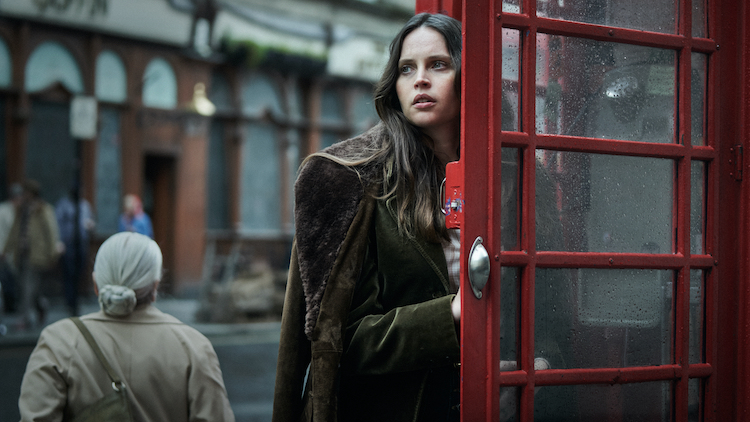 Charlie: The first scene that we shot with Felicity Jones was a scene in the phone box, and it was a very short scene that we didn’t have very long to shoot, but there was a delay in the interior of the pub that we were meant to be going into, and it gave us an unusually tiny window of more time which we were really happy to have because we were so excited about shooting the scene, and Felicity‘s performance was so extraordinary. We’d obviously been discussing the character of Catherine with her for a really long time, but to start seeing Catherine come alive was amazing. We ended up shooting it for way longer than we ever intended and from several different angles and different set ups. The amazing thing was we ended up using all of them. In the edit, we turned that one scene into about three. Yeah, that was also a great example of if you let yourself be open to the possibilities, then the narrative and the characters will lead you to the solutions.
Charlie: The first scene that we shot with Felicity Jones was a scene in the phone box, and it was a very short scene that we didn’t have very long to shoot, but there was a delay in the interior of the pub that we were meant to be going into, and it gave us an unusually tiny window of more time which we were really happy to have because we were so excited about shooting the scene, and Felicity‘s performance was so extraordinary. We’d obviously been discussing the character of Catherine with her for a really long time, but to start seeing Catherine come alive was amazing. We ended up shooting it for way longer than we ever intended and from several different angles and different set ups. The amazing thing was we ended up using all of them. In the edit, we turned that one scene into about three. Yeah, that was also a great example of if you let yourself be open to the possibilities, then the narrative and the characters will lead you to the solutions.
Barbara: Tom do you have another story?
Tom: I think the end. I think Colin and Aml on the beach - it was a very intense day; we had very little time to do it. We were in a hostile working environment on the beach and the wind. The light was falling. We had all the pressures that are just so common on making a film, but at the same time we had to shoot this very intense scene - the climax of the film - and as soon as we started rolling the cameras on both of them, they just gave us this magic. It was really breathtaking, and we were enormously grateful for that, for them both because they both just, with all the pressures of everything, just created this beautiful moment, for each of them to express their parts. That was a really beautiful moment, intense, but also very beautiful. And satisfying.
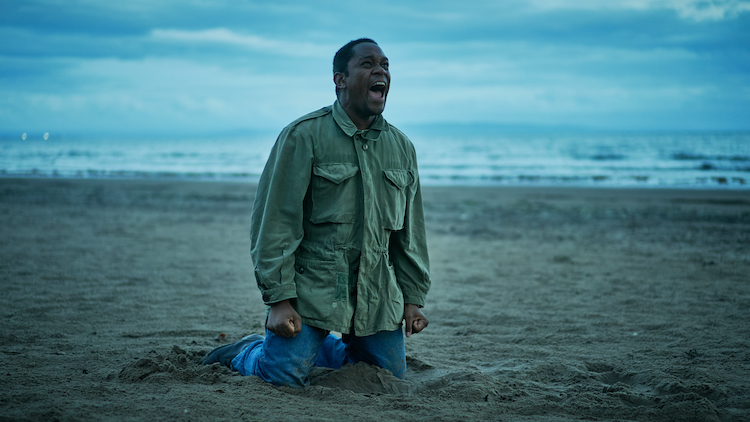 What I found satisfying was experiencing Aml Ameen’s performance throughout the film. DEAD SHOT proves more than just a revenge flick. It is currently available On Demand and Digital. Check out the trailer!
What I found satisfying was experiencing Aml Ameen’s performance throughout the film. DEAD SHOT proves more than just a revenge flick. It is currently available On Demand and Digital. Check out the trailer!
